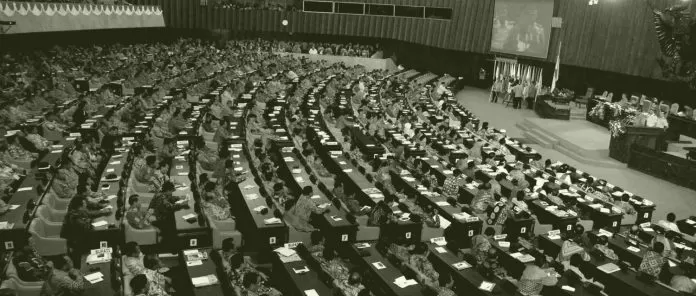(Originally published in The Economist)
[dropcap]T[/dropcap]o mark the start of Ramadan, Sharp Indonesia, an offshoot of a Japanese electronics giant, hosted a press conference to launch the world’s first halal fridge. Not a fridge for halal food, but an appliance that is supposedly sharia-compliant (although the Koran does not mention fridges). A recently passed, vaguely-worded law which comes into effect next year, stipulates that most products must be halal-certified, without precisely defining which products it means. Lawyers argue that it could apply to inedible goods, such as fridges, and even to services like consulting.
That is by no means Indonesia’s only woolly law. Under an open-ended one against defamation, creators of internet memes have been arrested for allegedly embarrassing politicians. An anti-pornography law allows officials to prosecute people who perform “actions deemed indecent” in public. A counter-terrorism statute, passed in May, is equally imprecise. Even those who harm the environment can be cast as terrorists.
Such broad-brush rules, so easily passed and approved in parliament, could be manipulated and used to turn on political protesters, points out Andreas Harsono of Human Rights Watch, a pressure group. Lawmakers are also unproductive. The parliament had a target of approving 52 bills in 2017, but passed only six – a figure which is not unusually low. This performance irks voters. “they do nothing; they just talk,” laments Pochaki, a manager in Jakarta. Draft laws typically take an agonizingly long time to be enacted. The current criminal code was adapted from a Dutch colonial precursor written in 1918, has not been revised since 1981. Talk of an update started in the 1980s, with the first of many drafts appearing in 1993. And only in 2018, the most recent draft may at last become law.
Why is Indonesia so bad at lawmaking? One reason is lack of expertise. It’s a particularly young democracy. Before that, the government, rather than the legislature drew up most laws. The job of lawmaking can fall to politicians, many of whom are inexperienced. Well over half the members of parliament after 2014 were new to the job.
Another concern is graft. Polls routinely find that the national parliament is considered the country’s most corrupt institution. A graft-busting commission has found grounds to arrest MPs from all ten of the parties represented in it.
Indonesia has a political culture of consensus and a motley array of parties in the government, with very little party discipline. Albeit decentralised, the problem is compounded by regional legislation. Provinces and regencies have the power to produce their own laws. This creates a “jungle” of often-contradictory regulation, says Simon Butt, a professor of Indonesian law at Sydney University. When local laws conflict with regulations issued by the central government, it is not clear which have precedence. Certain functions of government, such as granting logging permits, end up being done at both levels, thus creating confusion.
In 2016, the home affairs ministry tried to simplify the legal system by voiding 3,000 local regulations, only to be reversed by the constitutional court last year. The decision has emboldened provincial governors and regents and adds to the importance of regional elections to be held on June 27th. However, such polls are usually won on personality and local issues, rather than lawmaking ability. Indonesia’s legal jungle will not be cut down soon.




